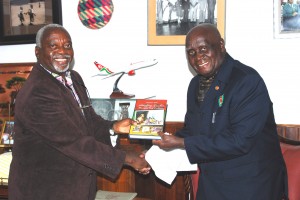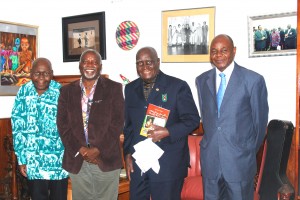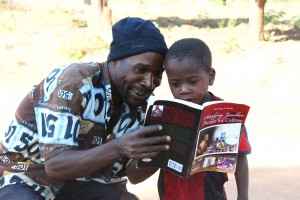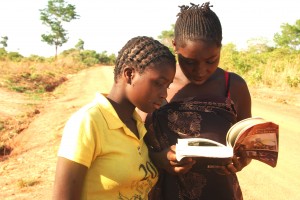by
Mwizenge S. Tembo, Ph. D.
Professor of Sociology
Author: “Satisfying Zambian Hunger for Culture”.
It is nearly over a month since President Sata died. Zambians are in a state of political hysteria both at home and abroad. I have been following news from Zambia every day. It seems there is minute to the minute political drama and jostling as political parties, potential candidates, the nation, and the Patriotic Front (PF) ruling party are focused

President Kaunda receives a copy of the book: “Satisfying Zambian Hunger for Culture” from Professor Tembo in November 2012.
on who will be elected the successor as President.
Dr. Christine Kaseba was in mourning for her deceased husband President Sata, and planned to be in seclusion as required in our Zambian culture. But within a matter of a day or two she had filed papers and had declared herself Presidential candidate. She said she had been urged to stand to save the party which was dominated by open squabbling. There is nothing wrong and everything right with her wanting to stand as President. After all, spouses work together, support each other, often share strengths, insights, and determination needed to become effective in most positions and careers each one may hold in society. Carazan Aquiono of the Phillipines became the 11the President of the Philipines after her husband was assassinated in 1986. Asif Ali Zardari became Prime Minsiter of Pakistan after his wife Benazir Bhutto who was the former Prime Minister of Pakistan. Hilary Clinton may become the first woman to be President of the United States if she decides to run in 2016. She is the wife to former American President Bill Clinton.
Concern as Zambians
What should concern all Zambians is that we do not have well established ways yet and sources of guidance as to how to conduct ourselves in these circumstances of important funeral customs and other major social events. It has generally been

After President Kaunda received the book: “Satisfying Zambian Hunger for Culture”. From right to left: The author’s late Uncle Mr. J. J. Mayovu, President Kaunda, Professor Tembo, and Mr. Mfula.
observed that hardly was the late President’s body cold and put in a coffin before people declared their candidacy and began campaigning. There was a story in the press that an educated woman attended a women only mourning session at President Sata’s numerous informal funeral gatherings wearing a short skirt when all the other women were wearing chitenjes as Zambian traditional symbols of modesty and proper mourning decorum. It is no secret that we educated Zambians are the worst at flouting these traditional rituals and customs as we regard them with contempt as archaic, anachronistic, old, backward and primitive. This superiority complex attitude toward our own culture may be misguided as an unfortunate remnant of our European colonial heritage.
Answers from “Satisfying Zambian Hunger for Culture”.
The questions we should be asking as Zambians are: “Do we know what our customs are?” “Should we follow all the traditional rituals and customs and why?” “How much of our traditional customs should we change and what should we adopt from other modern cultures?” Sometimes we can’t find good answers because either we don’t know our own traditional customs and knowledge enough in the first place, and are therefore torn and confused about how to behave in particular social situations. If you have questions, lack confidence, you have an inferiority complex, and feel an emptiness of meaning about our Zambian culture and indigenous technology; you may

A father who was in one of the photos in the book: “Satisfying Zambian Hunger for Culture” shows his son. This was at Chikana Village in Chief Magozi’s area West of Lundazi in November 2012.
be reading this article at the right time.
The book: “Satisfying Zambian Hunger for Culture” had contributions from four Zambians: Claire Miti is a Zambian who lives in UK. Ruth Mugala is a Zambian who lived in Canada and now is in Zambia. They wrote the long Chapter on how girls and women are raised in Zambia. James Mwape with Mwizenge Tembo contributed to the Chapter on Zambian traditional dances especially Kalela. The book describes so many significant aspects of Zambian culture that President Kaunda wrote the foreword to the book saying:
“Many books have been written about Africa covering many aspects of human development. To my knowledge, no man has described in greater detail various aspects of African culture as this book by Prof. Mwizenge S. Tembo. In my humble view, this book, Satisfying Zambian Hunger for Culture, fulfills the desire for understanding and appreciating our Zambian and African culture among my fellow citizens and non-Zambians whether they live here in Zambia or abroad in the diaspora.” (p.12)
Honey and Bee Stings
I will never forget what my fifty year old younger brother told me a few years ago while I was visiting at our village. He said: “Para mupenja uci, njuci zimulumaninge”

Two girls browsing the only copy the author had of the book: “Satisfying Zambian Hunger for Culture”. This was in November 2012 at Chikana Village in Chief Magodi’s area West of Lundazi.
translated: “ If you want to get honey be prepared to be stung by the bees”. The metaphor says that if you want anything that is very important in life, be prepared to suffer some pain and sacrifice before you achieve or get it. The book: “Satisfying Zambian Hunger for Culture” is probably the most important book for 15 million Zambians today. But it is difficult to get or buy the book in Zambia since it was published in the United States in September 2012. http://www.amazon.com/Satisfying-Zambian-Hunger-Culture-Social/dp/1479702080/ref=sr_1_1?ie=UTF8&qid=1417041864&sr=8-1&keywords=Satisfying+Hunger+for+Culture
In the whole of Zambia, there may be about 20 copies of the book. When those who are in the diaspora buy and read it, these are the e-mails I have been receiving like this one recently from Inonge Mulako:
“I am a biochemist/molecular biologist based in Germany. I recently purchased your book titled ‘Satisfying Zambian Hunger for Culture’. I am still reading the book and I do not normally write to authors of books that I find interesting, however, the subject of this book is very dear to my heart. I would personally like to thank you for this great book, it has stimulated many discussions among myself and my siblings . I have ordered books for a few other family members and I am looking forward to the discussions when we all meet for Christmas in December”.
You may have to make an effort to get the book. I would strongly recommend that all the Presidential candidates and top political leader from the eleven political parties should read the book with the idea of developing meaningful better manifestos on how the Zambian nation should go forward; Patriotic Front (PF), Movement for Multi-Party Democracy (MMD), United Party for National Development (UPND), Alliance for Democracy and Development (FDD), Agenda for Change (AfC) Party, National Restoration Party (NRP), Heritage Party (HP), United National Independence Party (UNIP), Forum for Democracy and Development (FDD), ULP, and National Democracy Focus (NDF).
Zambian Cabinet
All members of the Zambian cabinet should read this book. The Ministry of Foreign Affairs through Embassies abroad should gladly provide this book as a gift for those foreigners who truly want to understand Zambian people in the past, present, and the future. The book addresses Zambian political history, traditional dance, the detailed Zambian food customs especially our nshima staple food and various relishes or ndiyo, umunani, dende, or ndiwo. What about the role of religion, Christinaity and witchcraft among Zambians, traditional and modern diseases and treatments? What about the future? etc. etc. The book has 17 Chapters. This is the book to have not tomorrow but now.
Is Acting President Guy Scott a Muzungu?
Chapter Three addresses the very delicate subject of our Zambian identity. How do we identify ourselves as Zambians with 72 tribes and a very tiny minority of whites and non-Africans? The word muzungu has been used now for over a century, often in a negative way, as describing anyone who is white. Mwenye similarly is used in a very unique non-racist Zambian way. But we Zambians describe muzungu in such a way that we don’t regard Guy Scott as a Muzungu but at the same time we sometimes refer to some particular black Zambians as ba muzungu including African Americans. How is this possible? You may ask. After you read this chapter in the book you may for the first time as a Zambian realize that we have a very different complex but forgiving conception of race such that we feel comfortable with all our fellow white Zambians as citizens because the majority of them don’t behave like a muzungu but behave like munthu or a Zambian or African.
Most important Book.
This may be the most important book for all 15 million Zambians. I was born and lived in the village totally immersed in Zambian and African language and culture in the late 1950s among the Tumbuka in Lundazi. I witnessed Zambia growing as a young nation and went to school at Tamanda Misison Upper School and Chizongwe Secondary School. I went to the University of Zambia from 1972 to 1976 majoring in Psychology and Sociology. I taught Social Development Studies, was a Research Fellow at the then Institute of African Studies of the University of Zambia, from 1977 to 1989. I have taught at colleges and read so much material on African culture here in the United States for the last 20 years. The book: “Satisfying Zambian Hunger for Culture” is so good that I gave a copy to President Kaunda. I called Cabinet Office to arrange to give a copy personally to President Sata around December 16 in 2012. I now regret that I never made it to State House to personally hand him a copy of the book. My three months sabbatical leave had come to an end. I run out of time as I had to fly out of the country back to my college here in the USA where I am a lecturer or Professor.